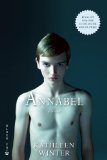Summary | Excerpt | Reading Guide | Reviews | Beyond the Book | Readalikes | Genres & Themes | Author Bio

A Novel
by Kathleen Winter1
New World
Wayne Blake was born at the beginning of March,
during the first signs of spring breakup of the ice —
a time of great importance to Labradorians who hunted
ducks for food — and he was born, like most children in
that place in 1968, surrounded by women his mother had
known all her married life: Joan Martin, Eliza Goudie,
and Thomasina Baikie. Women who knew how to ice-fish
and sew caribou hide moccasins and stack wood in a pile
that would not fall down in the months when their husbands
walked the traplines. Women who would know,
during any normal birth, exactly what was required.
The village of Croyden Harbour, on the southeast
Labrador coast, has that magnetic earth all Labrador
shares. You sense a striation, a pulse, as the land drinks
light and emits a vibration. Sometimes you can see it with
your naked eye, stripes of light coming off the land. Not
every traveller senses it, but those who do keep looking
for it in other places, and they find it nowhere but desert
and mesa. A traveller can come from New York and feel
it. Explorers, teachers, people who know good hot coffee
and densely printed newspapers but who want something
more fundamental, an injection of New World in their
blood. Real New World, not a myth that has led to highways
and more highways and the low, radioactive buildings
that offer pancakes and hamburgers and gasoline on
those highways. A traveller can come to Labrador and
feel its magnetic energy or not feel it. There has to be
a question in the person. The visitor has to be an open
circuit, available to the power coming off the land, and
not everybody is. And it is the same with a person born
in Labrador. Some know, from birth, that their homeland
has a respiratory system, that it pulls energy from
rock and mountain and water and gravitational activity
beyond earth, and that it breathes energy in return. And
others don’t know it.
Wayne was born, in bathwater, in the house of his
parents, Treadway and Jacinta Blake. Treadway belonged
to Labrador but Jacinta did not. Treadway had kept the
traplines of his father and he was magnetized to the
rocks, whereas Jacinta had come from St. John’s when
she was eighteen to teach in the little school in Croydon
Harbour, because she thought, before she met Treadway,
that it would be an adventure, and that it would enable
her to teach in a St. John’s school once she had three or
four years of experience behind her.
“I would eat a lunch of bread and jam every day,”
Joan Martin told Eliza and Thomasina as Jacinta went
through her fiercest labour pains in the bathtub. Every
woman in Croydon Harbour spoke at one time or another
of how she might enjoy living on her own. The women
indulged in this dream when their husbands had been
home from their traplines too long. “I would not need
any supper except a couple of boiled eggs, and I’d read a
magazine in bed every single night.”
“I’d wear the same clothes for a week,” Eliza said.
“My blue wool pants and grey shirt with my nightie
stuffed under them. I would never take off my nightie
from September till June. And I would get a cat instead of
our dogs, and I would save up for a piano.”
The women did not wish away their husbands out
of animosity — it was just that the unendurable winters
were all about hauling wood and saving every last piece
of marrow and longing for the intimacy they imagined
would exist when their husbands came home, all the
while knowing the intimacy would always be imaginary.
Then came brief blasts of summer, when fireweed and
pitcher plants and bog sundews burst open and gave the
air one puff, one tantalizing scented breath that signalled
life could now begin, but it did not begin. The plants were
carnivorous. That moment of summer contained desire
and fruition and death all in one ravenous gulp, and the
women did not jump in. They waited for the moment of
summer to expand around them, to expand enough to
contain women’s lives, and it never did.
Excerpted from Annabel by Kathleen Winter. Copyright © 2011 by Kathleen Winter. Excerpted by permission of Grove Press. All rights reserved. No part of this excerpt may be reproduced or reprinted without permission in writing from the publisher.
Your guide toexceptional books
BookBrowse seeks out and recommends the best in contemporary fiction and nonfiction—books that not only engage and entertain but also deepen our understanding of ourselves and the world around us.